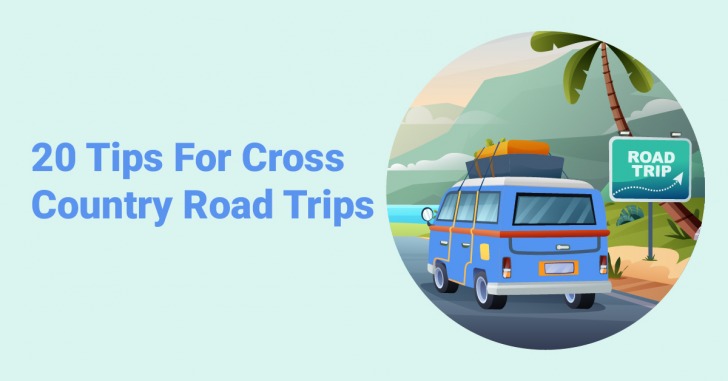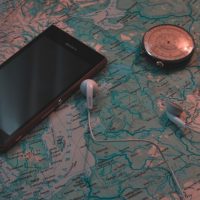Know someone who doesn’t love cross-country road trips?
Neither do we.
It’s that sense of freedom and adventure, the wide open roads, your friends in the back with the windows down, and your favorite music playing.
Until you break down in the middle of nowhere, can’t find a rest stop, or find out you forgot something important.
Yep… those are things you definitely don’t want to happen.
Road trips are meant to be adventurous and spontaneous.
But that doesn’t mean you shouldn’t prepare!
You want to experience a smooth, trouble-free trip of a lifetime, after all.
So here are 20 tips for cross-country road trips that you need to know before setting off.
Stave off monotony, be prepared for any situation, and keep morale high!

Contents
- 1. Have Your Vehicle Serviced
- 2. Plan Your Route By Destination
- 3. Join A Roadside Rescue Plan
- 4. Create A Realistic Budget
- 5. Plan Ahead For Pets
- 6. Pack Minimally
- 7. Be Familiar With Local Laws
- 8. Double-Check Your Roadside Assistance Options
- 9. Prepare For Weather Changes
- 10. Make Lodging Reservations In Advance
- 11. Stock Up On Drinks And Snacks
- 12. Download Entertainment Like Audiobooks, Podcasts, And Music
- 13. Keep Charged With Portable Chargers
- 14. Have A Day-Trip Backpack
- 15. Pack A First Aid Kit
- 16. Bring A Cooler
- 17. Plan For Lots Of Rest Stops
- 18. Consider A Roof-Rack Container
- 19. Try Camping On The Way
- 20. Avoid Rush Hour Traffic And Peak Dinner Times
- Summary
1. Have Your Vehicle Serviced
It might be tempting to hit the road quickly – especially if you and your friends or family discover a great destination that’s just a few hours away.
But breaking down is one of the fastest ways a road trip can go from good to bad.
Worse if it happens in the middle of nowhere.
This makes servicing your vehicle beforehand well worth your time and money.
Have the basics checked, including brakes, fluids, and tires, as well as other important factors such as your car headlights, power steering, and AC system.
Vehicle servicing isn’t just for peace of mind, but also for passenger safety.
So it’s as important as it is practical.
In fact, having your vehicle serviced a week or two in advance is also a good idea, as it will allow time for any surprise repairs or replacements.
While you’re at it, think about the essential items you should have in your car, such as a flashlight, tire pressure gauge, car jack, and spare tire.
Even new cars can develop faults, so you can’t be too prepared.

2. Plan Your Route By Destination
Whether you have a handful of destinations in mind or just one, planning your route in advance is beneficial for several reasons.
It can save time, for one, by reducing the possibility of getting lost.
It can also help you plot out possible rest stops, restaurant breaks, and accommodation options.
For long road trips, in particular, driving can get monotonous, even if you share the driving with others.
Planning your route can help you reach your destination quicker, as well as prevent car accidents – since unfamiliarity can make even the most confident drivers nervous.
For that reason, it’s also worth checking out what the route involves.
There might be tricky intersections, narrow roads, closures, or borders to cross – all of which are worth knowing about in advance.
You can use Google Maps or another navigation app to find the best route for your destination, as well as what’s along the way.
Study the route as best as you can, but also consider the best backup routes in case of diversions.
3. Join A Roadside Rescue Plan
In addition to having your vehicle serviced, boost your peace of mind by joining a roadside rescue plan.
We’ve all questioned whether roadside assistance is needed, but it simply ensures you’re in good hands in case of a breakdown or car accident – without all the unexpected expenses these can also come with.
It’s just convenient and reassuring, and will help you out of a tight spot should your vehicle need repairing or towing to the nearest gas station or vehicle shop.
Think about it: nothing can be much worse on a cross country road trip than breaking down in an unfamiliar location and not knowing who to contact or where to go for assistance.
As a little bonus, some roadside rescue plans offer other perks, such as discounts for accommodation and car rentals, giving you more reasons to sign up.
But above all, having a roadside rescue plan is by far the quickest way to get back on the road as soon as possible.
And when you’re on a road trip with friends, it should go without saying that you’ll want to reach your destination without delays.
4. Create A Realistic Budget
Like vacations, coming up with a budget is a smart idea for any kind of cross-country road trip.
But not just a general budget; a realistic budget that takes emergency expenses into account and any essentials you might have to buy throughout your trip.
Emergency expenses can include car repairs, extra gas, last-minute accommodation, and medication.
As for essentials, these might be anything from drinks and snacks to spare clothes, camping supplies and outdoor gear, phone chargers, and toiletries.
All in all, factoring in everything you might have to spend during your cross-country road trip is the best way to avoid surprise expenses and, as a result, running out of cash.
Aside from emergency expenses and essentials, don’t forget the main things: estimated gas costs, accommodation, restaurant and cafe stops, and attractions.
Write them all down in a clear list, consider your max budget for each one, then allocate a realistic amount to fall back on – just in case.
Hey, you may be someone who likes to collect travel souvenirs, so make sure to include those in there too.
5. Plan Ahead For Pets
If you’re thinking about taking your furry friend on a road trip, it’s well worth planning ahead.
Taking a pet is taking a passenger, after all, and that comes with the responsibility of making sure they’re happy, stress-free, and comfortable from the moment you set off to the moment you arrive at your destination.
As a result, think about all the essentials and comforts they’ll need during your cross-country road trip, both in the car and when you arrive at your destination.
This can include drinks, snacks, treats, medications, toys, blankets, beds, and leashes.
Pet safety is also important while driving, so, if your pet needs it, make sure you have a crate or carrier that’s both comfortable and secure.
Last but not least, if it’s your pet’s first time on a long-distance journey, stay mindful of their mood and prepare to make extra stops.
This will help keep boredom and restlessness at bay and give them a chance to stretch and move around.
6. Pack Minimally
It might sound counterintuitive, but packing minimally for your road trip will do two things: reduce stress and improve comfort.
Taking too much stuff, particularly things you don’t need, can weigh down your vehicle and make it hard to find essentials in a hurry.
It can also reduce space in your vehicle and, as a result, the comfort of your passengers.
And no one likes to be squashed on long car trips.
So, just like listing expenses, it’s a good idea to list the essentials you need to pack.
Think about whether you need it or not, and even how much you’ll think you’ll use it.
Creating a list of things to pack will also help prevent the possibility of forgetting something important.
This can result in having to buy it, which can then throw off your carefully planned budget!
Let’s face it: we’re all guilty of packing too much before vacations and trips.
So, this time around, make sure to plan out what you’ll need beforehand and leave out the things that aren’t important or probably won’t see much use.
7. Be Familiar With Local Laws
The last thing you want on your cross-country road trip is to get involved with the law – especially for something that you didn’t realize you couldn’t do.
This can result in a big drop in morale, firstly, but also penalties and fines that you, needless to say, wouldn’t have included in your budget plan.
So wherever you are heading, particularly if you are entering another state, make sure to familiarize yourself with local laws.
These may include speed limits, smoking laws, pet laws, parking regulations, general driving laws, noise ordinances, and laws for interacting with wildlife.
There may even be laws you didn’t think existed, so it’s well worth being aware of them—and making your friends and family aware of them—before you set off.
Thankfully, any laws and regulations for a local area can be found online or by contacting the local law department.
It won’t take long to find these out and it will save you from what would be, at the least, an unpleasant inconvenience.

8. Double-Check Your Roadside Assistance Options
We mentioned joining a roadside rescue plan earlier.
But if you already have a roadside rescue plan, it’s well worth double-checking what your plan entails before your road trip, including all the roadside assistance options you have available to you.
This can include car towing, unlocking your car if you’re locked out, jump starts, fuel delivery, tire changes, and so on.
For many of us who have been driving for a while but (thankfully) not had to use roadside assistance, it’s easy to forget what our roadside rescue plan includes – or even the process for what number to call and what information we need to provide.
So depending on whether you need to check online or call up your roadside assistance provider, make sure you brush up on your options and what to do should you end up needing assistance on the road.
While you’re at it, save any important contact numbers in your phone and make sure you have all necessary documentation stored in your vehicle.
Some road assistance providers also offer their own mobile app, which is worth downloading if you like added convenience.
9. Prepare For Weather Changes
As much as we all want perfect road trip weather, it can always change in an instant – especially on cross country road trips.
You might be visiting a checklist of attractions and national parks, or simply winging it.
Either way, you can’t go wrong by preparing for weather changes.
This includes cold weather, hot weather, and rain.
You don’t want to be caught in a rainstorm while hiking or slowly cooking in the car without bottles of water on hand, so the weather is another thing worth accounting for before setting off.
Of course, you still ideally want to travel light, so think about the bare essentials you’ll need for different weather conditions, both when driving and doing activities.
Items like a light raincoat, umbrella, blanket, sunglasses, sunscreen, sun hat, towel, hand fan, and a waterproof case or bag for your phone can be lifesavers when the weather suddenly changes.
Thankfully, most of these items are light and easily packed into a bag without taking too much space.
Even if you don’t use them, it’s better to have them than get caught off guard!
10. Make Lodging Reservations In Advance
Imagine this for a moment: It’s dark, you’ve been driving for hours, and tiredness is setting in.
You come across a motel or lodge to stay at but, once you get to the reception desk, they tell you there are no available rooms.
Back to the car to find the next option.
This can be avoided by making lodging reservations in advance.
And if you plan out your route, including the location you should be when evening arrives, you’ll have a general idea of where you can stay the night.
By searching for lodging options and booking in advance, you can eliminate the need to hunt for last-minute accommodation while driving, plus the frustration of getting turned away due to unavailability.
Staying somewhere overnight will also help to break up your trip and reduce tiredness and crankiness.
Of course, you shouldn’t drive when you’re sleepy as well, so making lodging reservations in advance is one way to stay energized and in a good mood.

11. Stock Up On Drinks And Snacks
Taking drinks and snacks with you on a cross-country road trip is a given.
But don’t just take a few; stock up on them!
The good thing about drinks and snacks is that they’ll never go unused.
And when you do use them, you’ll also be freeing up space in your bag and car.
Still, make sure to stock up on the right drinks and snacks.
Opt for ones that are non-perishable, filling, and convenient to pack and eat, as you never know when hunger will strike or when you need some extra energy to keep you going.
This is especially important if you plan on camping or hiking.
You don’t want to run out when you’re out in the wild and far from a convenience store, so packing enough drinks and snacks is something you can’t go overboard with.
At the least (if you want to travel super light), pack a few emergency drinks and snacks and keep them in your vehicle.
You can also top up on drinks and snacks during your road trip – just make sure you know where the convenience stores and supermarkets are located along your route.

12. Download Entertainment Like Audiobooks, Podcasts, And Music
Downloading entertainment for your road trip is a useful tip – with emphasis on download.
Digital entertainment like audiobooks, podcasts, and music won’t take up any physical space, and can stave off boredom and instantly improve the general mood for you and whoever’s coming along for the ride.
Sure, you might have an ample collection of CDs stored in your cubby hole, but other passengers might not feel as strongly about your music taste.
Plus, you can free up this space and keep everyone entertained by using a streaming service and preparing a few mixed playlists in advance.
By downloading entertainment, you can also ensure you have something to watch or listen to should you lose internet connection.
And if you plan on camping and exploring the great outdoors, there’s a good chance this can happen.
All in all, preparing road trip entertainment is a great way to ease the monotony of long drives and keep everyone in a good mood. So it’s well worth doing.
13. Keep Charged With Portable Chargers
For many of us, there’s nothing worse than running out of battery.
On a road trip, this can be all the more inconvenient, since you might need your phone for GPS navigation, updating friends and family, and emergency use.
So it’s crucial to keep charged.
This includes not forgetting your chargers, as well as taking spare portable chargers just in case one gets lost or broken.
If you want to charge devices in your car, don’t forget the necessary adaptors as well for each charger.
A great alternative is a portable power bank (or even several), which will allow you to charge your devices on the go, no matter where you are.
Just don’t forget to charge those up too.
Better yet, you can also take a fully charged spare phone with you to store away in your vehicle or bag as an extra backup.
Make sure it can make calls and texts, with all the necessary numbers you need already saved on it.
14. Have A Day-Trip Backpack
You’ve packed several bags for a road trip.
But what about a backpack suitable for a day trip?
Cross country road trips open up endless opportunities for spontaneous visits to attractions, parks, and more.
And if your friends or family suddenly agree to explore a popular national park or tourist attraction for the day, you don’t want to be unprepared.
So avoid the hassle of trying to pack a day-trip backpack at the last minute.
It’s stressful, and will likely result in forgetting something important.
Just a few important things you can pack in your day-trip backpack include water, snacks, chargers, light rain jacket, sunscreen, flashlight, spare socks, navigation tools, insect repellent, emergency cash, and a small first aid kit.
Choosing a suitable day-trip backpack is as important as the items you’ll need to put in it.
So make sure your backpack is comfortable around the shoulders, waterproof, and made of a strong material that won’t tear under heavy weight or friction.
For convenience, choose a backpack that also has well-placed pockets for storing a water bottle and a few energy snacks.

15. Pack A First Aid Kit
First aid kits often get forgotten – or overlooked altogether.
But if you’re setting off on a cross country road trip, packing a first aid kit is a must, especially if you plan on doing outdoor activities like hiking, cycling, and kayaking.
Even if not, having a small first aid kit can treat various injuries and even save a life.
So it’s important and something you should definitely pack.
First aid kits come in a range of sizes, but the essentials any first aid kit should contain include gauze pads, bandages, adhesive tape, antiseptic wipes (or antiseptic solution), tweezers, scissors, pain relievers, and disposable gloves.
If you need to, it’s also worth brushing on basic first aid, such as treating wounds and performing CPR.
You can keep a first aid kit in your car or in your bag (or both).
Either way, having a first aid kit on hand is better than not having one – even just for the peace of mind.
16. Bring A Cooler
Ever sipped on a warm soda or beer on a hot day?
Bringing a cooler on your road trip is essential.
And it’s just not for keeping your drinks cold and refreshing, but for any food that needs to be kept at cooler temperatures.
This includes dairy products, fruits and vegetables, sandwiches, and any meat you might take if you plan on camping or hiking and setting up a barbecue.
Just as important as bringing a cooler is making sure to pack it with enough ice.
Not having enough ice can result in ineffective cooling, or even spoiled food, so it’s worth packing it with as much ice as possible.
On top of that, don’t forget to top up the cooler with ice during your road trip.
You might not need a cooler at the start of your cross country road trip, but it’s still worth packing in your car.
After all, it can be pulled out for a day trip or activity and filled up with drinks and food any time you pass a supermarket
or convenience store.
And if your friends and relatives forget to bring one, they’ll thank you for remembering.

17. Plan For Lots Of Rest Stops
You might not think you need that many rest stops.
But in most cases, the opposite ends up being true.
Despite that, there are a handful of benefits to planning lots of rest stops.
Having many rest stops on your cross country road trip offers more chances to stretch your legs, eat and drink, and take a break from the monotony of driving for several hours non-stop.
Spreading rest stops throughout the journey can also reduce the risk of your passengers needing a toilet break at an inconvenient time or place.
What’s worth mentioning is that rest stops don’t have to be gas stations, restaurants and cafes, or convenience stores.
You can mix up your rest stops by stopping at parks, famous landmarks, or even popular tourist spots.
This is another great reason to plan your route before heading off.
You can check which landmarks and attractions are on the way to your destination, then plan more creative and exciting rest stops in advance.
It should also go without saying that you should prepare to stop more if you’re bringing pets or children on your cross country road trip.
Children and pets typically get restless on long journeys, so planning more rest stops is important to avoid any incidents.

18. Consider A Roof-Rack Container
If these tips are saying anything, it’s that you can never prepare enough for your cross country road trip.
And one way you can prepare extra supplies and gear is by considering a roof-rack container.
Roof-rack containers, also called roof cargo carriers, can fit securely on the top of most vehicles and essentially act as a second trunk.
This will allow you to pack more things, as well as free up space in other areas of your vehicle.
Another good thing about roof-rack containers is that they come in different sizes.
So not all roof-rack containers are expensive, and you’re sure to find one that will fit within your road trip budget.
If you do plan on purchasing one, just make sure that it will fit the size of your vehicle and not exceed its weight limit when filled up.
Durability and security are more important factors, so investing in one that’s weather-resistance and lockable is worth the extra cash.
Most importantly, make sure that the roof-rack container is properly mounted on your vehicle.
If you’ve never installed one before and you’re not sure how to do it, get a professional to do it for you to save any trouble.
After all, you don’t want to arrive at your destination only to realize that your roof-rack container came off several hundred miles back.

19. Try Camping On The Way
Cross country road trips just set the mood for spontaneity and adventure.
So why not try camping on the way?
No matter whether you have one or several destinations planned, stopping to camp along the route is the perfect way to add some more excitement to your cross country road trip.
If you own a tent, camper van, or motorhome, these are more great reasons to set up camp on the way.
So while planning out your route, check for various designated camping areas, including public camping grounds, national parks, and state parks.
Once again, don’t forget to check local laws so you know what the regulations and restrictions are.
All in all, camping on the way can make your road trip more enjoyable, break up long drives, and allow you to really take advantage of any natural attractions that are on the route.
Compared with booking accommodation, camping can also save you money, which will free up your budget for other fun activities.

20. Avoid Rush Hour Traffic And Peak Dinner Times
Last but not least, our final must-know tip is making sure to avoid rush hour traffic and peak dinner times.
Both of these can cause delays and set your arrival time back (by a few hours or sometimes more), so it’s well worth planning your journey ahead of time to avoid these as much as possible.
When looking at your route and how long it will take you to get there, think about where you might be during rush hour and, if it’s a busy, traffic-prone location, what time you should leave to avoid it.
If you can’t adjust your leaving time, consider if there’s a less-congested route you can take instead – even if it means a slight detour.
Once you’ve set off on your cross country road trip, it’s also a good idea to avoid peak dinner times, especially in popular areas.
Heading into a busy restaurant at peak dinner time can sometimes mean waiting longer than usual to be served, which can mess up any arrival times you might have planned beforehand.
As a result, stock up on plenty of drinks and snacks and don’t forget that cooler full of sandwiches.
These will prove useful when appetites are high at dinnertime as well as in the unfortunate, sometimes unavoidable event of getting stuck in rush hour traffic.
Summary
To summarize, prepare well ahead of time and consider all the ways you can make your cross country road trip more exciting and memorable.
Sure, road trips are sometimes more fun when they’re spontaneous and unplanned (we’ve all done it), but it’s still worth knowing what you need to bring and what you need to do in case of an emergency.
Some of our most valuable tips from the above include getting your vehicle serviced before you set off, planning rest stops and landmark visits along the way, researching local laws, preparing for sudden weather changes, and making lodging arrangements in advance.
Above all, keep safe and have fun.
Cross country road trips offer an experience like no other, so everyone should go on a cross country road trip at least once!











